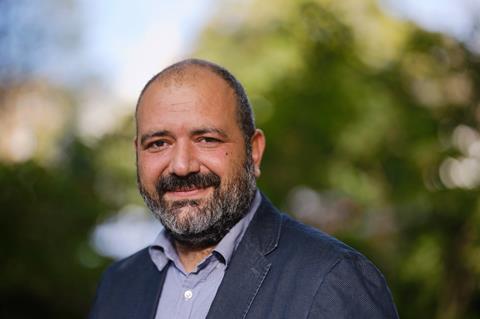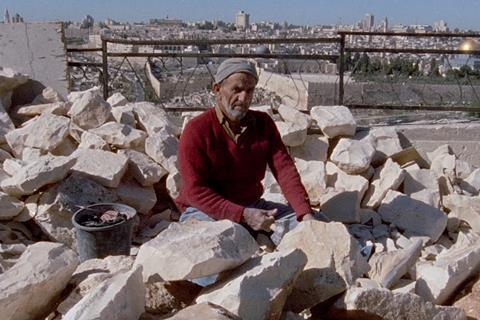
On the eve of International Documentary Festival Amsterdam (IDFA) artistic director Orwa Nyrabia announced this edition would be his final one.
He is quick to scotch any idea this was a shock decision. His contract runs out in July 2025 and, after seven years at the helm, he felt it was time to move on. “One should leave at the time safest for the organisation and for myself. This is the right time,” says the Syrian filmmaker who may return to filmmaking.
After receiving a record 4,000 submissions, this year’s IDFA opens today (November 14) with the premiere of Piotr Winiewicz’s About A Hero. Sold by Film Constellation, this hybrid project uses an AI programme named ‘Kaspar’, to create a script in the style of Werner Herzog — and includes a deepfake version of Herzog himself.
“It is an oddball of a film, as it should be when you approach such a new territory,” Nyrabia says. “AI is one of the key questions of humanity. We all have our fears and are excited by the possibilities. This is a rare example of a film that is not just showcasing what AI can do… it is allowing me as a viewer to contemplate this fake duel between the great human artist and the AI who studied him.”
Global identities
If AI is a hot topic for documentary makers, global politics continues to dominate the conversation. The international competition includes Rule Of Stone, an Israeli-made documentary from Danae Elon that looks at the role architecture in Jerusalem played in the ’invisible war of annexation’ against the Palestinians.

“Identities are not defined by our ancestry or heritage in a direct sense only,” reflects Nyrabia. “It is not about the background [of the filmmaker]. It’s much more about how we come together, no matter our heritages, to seriously try and understand how we got to this terrible moment in history, and find those little points of optimism.
That is also important given 2023 was a notably fractious edition of IDFA, with pro-Palestine protests, complaints about programming choices from both Palestinian and Israeli filmmakers and organisations and a number of filmmakers withdrawing their work.
In August, Nyrabia organised a closed-doors international symposium at which stakeholders could discuss how festivals and cultural organisations should navigate the tumultuous global political landscape.
“I believe that the levels of indirect censorship and self-censorship in our field are at a historical high,” he says. “We needed a moment where people could feel really free to speak their mind and to ask difficult questions.”
The festival will pick up on some of the symposium discussions during industry talk ‘Finding The Compass - The Responsibilities of Documentary Institutions’ hosted by former Sundance head and Channel 4 arts executive Tabitha Jackson and curator Dominic Willsdon, taking place on November 17.
With IDFA opening today, just a week after Israeli football fans were attacked on the streets of Amsterdam, Nyrabia draws attention to competition film Home Game, directed by Bosnia-born, Netherlands-based Lidija Zelovic. The film explores how Dutch society has drifted to the political right, and its similarities to the Balkans in the 1990s.
“In Western countries there is always this general perception that we are ahead of others,” notes Nyrabia. “But then we see the extreme right win elections, like the case in the Netherlands [the country’s current coalition government is the most right wing in its history] and Donald Trump in the US. This rise of a nationalist identity based on rejecting and undermining others will lead to terrible times.”
And while there have been suggestions from certain European countries that they haven’t been as well represented in the festival under Syrian filmmaker Nyrabia, he dismisses any idea he is selecting fewer, say, Nordic films than were shown in the past.
“I don’t think there is an underrepresentation,” he states. “But it is also a fact that there has been an increased leaning [by filmmakers] toward the US market that has made Sundance a priority for economic reasons. We need to be honest about that. You cannot want the Oscar or US market deal and then blame IDFA for welcoming an African filmmaker in your place.”
Raising voices
Nyrabia is also outspoken about the state of the industry; in particular, the role of public broadcasters, who are being accused of abandoning sales agents and distributors. He talks of “silent censorship” — for example, from European broadcasters who praise Arab films but then decline to back or buy them.
“This is not a surprise. Gradually we are seeing political influence seeping into state institutions. I find this to be very scary. It needs checks and balances and people raising their voices.”
People like Belgian director and guest of honour Johan Grimonprez, who is presenting his latest feature, Soundtrack To A Coup d’Etat, and is also the subject of a retrospective. Nyrabia notes that at a time when buyers seem to be “closing their doors against political documentary film,” Grimonprez’s work has an added topicality, giving lie to the idea that “political investigation is a journalistic genre, not an artistic genre.”
“The recent decisions in Germany banning funding of art and cultural work that is going to be critical of Israel is the extreme,” Nyrabia continues. “We need to remember that documentary film has always been annoying to authorities. Seeking reconciliation between governments and documentary film will kill documentary – this is a betrayal to the core of what documentary filmmaking is.”
IDFA is taking place from November 14-24.






![The Brightest SunScreen[Courtesy HKIFF]](https://d1nslcd7m2225b.cloudfront.net/Pictures/274x183/3/5/0/1448350_thebrightestsunscreencourtesyhkiff_312678.jpg)

















